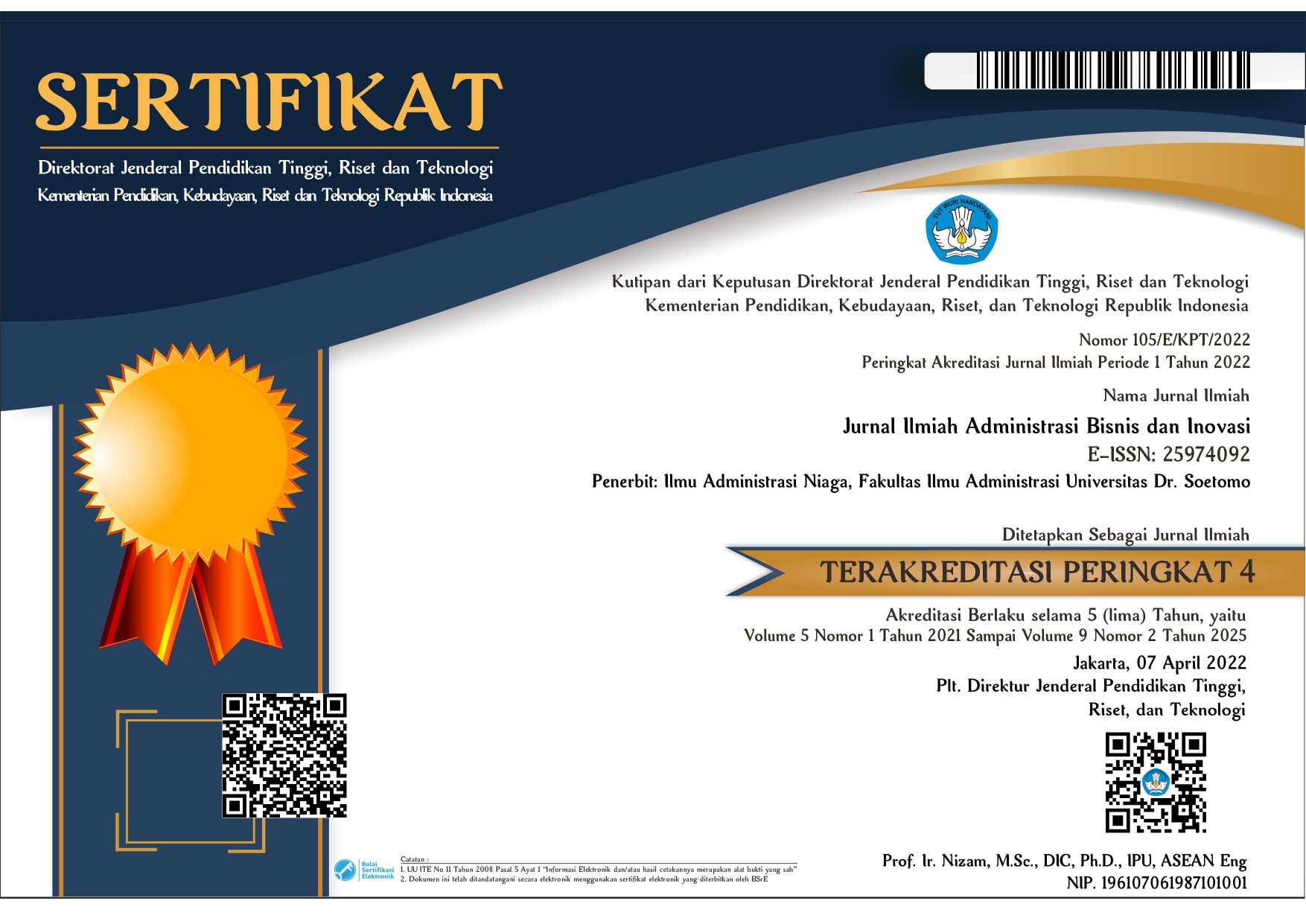PENGARUH PERPUTARAN PIUTANG DAN PERPUTARAN PERSEDIAAN TERHADAP PROFITABILITAS
Pada Perusahaan Sub Sektor Makanan Dan Minuman Yang Terdaftar Di Bursa Efek Indonesia Periode Tahun 2016-2020
 Abstract views: 321
,
Abstract views: 321
,
 Full Text (PDF) downloads: 427
Full Text (PDF) downloads: 427
Abstract
There are several objectives in this study, including: To find out and analyze the effect of receivable turnover and inventory turnover partially on profitability in food and beverage sub-sector companies listed on the Indonesia Stock Exchange for the period 2016-2020. And also to find out and analyze the effect of receivable turnover and inventory turnover simultaneously on profitability in food and beverage sub-sector companies listed on the Indonesia Stock Exchange for the period 2016-2020.
The sample in this study was the financial statements on 9 (Nine) food and beverage sub-sector companies listed on the Indonesia Stock Exchange for the period 2016-2020 which amounted to 45 financial statements selected using purposive sampling techniques. The data used is secondary data taken from www.idx.co.id data. This study uses quantitative methods with multiple regression analysis techniques assisted by using the SPSS (Statistical Product and Service Solution) application program version 20.
The results of the first t test proved that the hypothesis partially had no effect on independent variables i.e. the variable turnover of receivables to profitability was not proven to be true. While the results of the second t test proved that the hypothesis partially affects independent variables, namely inventory turnover to profitability is proven to be true. And the results of regression analysis from the F test showed that simultaneously or together there was an influence between the variable turnover of receivables and inventory turnover affecting profitability in food and beverage sub-sector companies listed on the Indonesia Stock Exchange.
References
Astiar, A. D., & Lestariningsih, M. (2020). Pengaruh Perputaran Modal Kerja, Perputaran Kas, Dan Likuiditas Terhadap Profitabilitas. Jurnal Ilmu Dan Riset Manajemen, 9(1), 1–16.
Friyanto. (2012). Auditing. Bayumedia Publishing.
Hamid, E. (2020). Analisis Perputaran Persediaan Terhadap Profitabilitas Pada PT Gudang Garam Tbk. Yang Terdaftar Di Bursa Efek Indonesia. Jurnal Proaksi. Vol. No. 2 Juli – Desember 2020. 15-24.
Husnan, Suad. 2009. Dasar-Dasar Teori Portofolio dan Analisis Sekuritas. Edisi Ketiga. Penerbit UPP AMP YKPN. Yogyakarta
Hermawan, S., & Amirullah. (2016). Metode Penelitian Bisnis: Pendekatan Kuantitatif & kualitatif. In MNC Publishing.
Jenah, A dan Yuli, R. (2019). Pengaruh Perputaran Persediaan Dan Perputaran Piutang Terhadap Profitabilitas. Jurnal Akuntansi, Vol. 8, No. 2, November (2019). 155-163
Kasmir. (2016). Pengantar Manajemen Keuangan (2nd ed.). Prenada Media.
Kasmir. (2018). Analisis laporan keuangan (11th ed.).
Luh Komang.S., I Wayan Suwendra, dan Wayan Cipta. 2014.” Pengaruh Perputaran Piutang, Periode Pengumpulan Piutang Terhadap Profitabilitas Perusahaan Pembiayaan yang Terdaftar di Bursa Efek Indonesia (BEI) Tahun 2008-2012. Jurnal Manajemen Indonesia. Vol.2, No 1.
Munawir, S. (2014). Analisa Laporan Keuangan. Liberty. Naibaho, E. P., & Rahayu, S. (2014). Pengaruh Perputaran Piutang Dan Perputaran Persediaan Terhadap Profitabilitas (Studi Empiris Perusahaan Makanan Dan Minuman Yang Terdaftar Di Bei Tahun 2008-2012). E-Proceeding of Management, 1(3), 1–13.
Naibaho, E. P., & Rahayu, S. (2014). Pengaruh Perputaran Piutang Dan Perputaran Persediaan Terhadap Profitabilitas (Studi Empiris Perusahaan Makanan Dan Minuman Yang Terdaftar Di Bei Tahun 2008-2012). E-Proceeding of Management, 1(3), 1–13
Prakoso. (2014). Pengaruh Profitabilitas, Kepemilikan Keluarga, dan Corporate Governance Terhadap Penghindaran Pajak di Indonesia. Jurnal Simposium Nasional Akuntansi XVII. Lombok. 2014.
Pratiwi, D. (2017). Pengaruh Perputaran Modal kerja, Perputaran Piutang Dan Perputaran Persediaan Terhadap Profitabilitas Pada Perusahaan Industri Barang Konsumsi Di Bursa Efek Indonesia. Jurnal Ilmu Manajemen, 7(1), 1–14.
Ramadani, D., & Rasyid, R. (2019). Pengaruh Perputaran Kas, Perputaran Piutang dan Perputaran Persediaan terhadap Profitabilitas pada Perusahaan Makanan dan Minuman yang Terdaftar di Bursa Efek Indonesia Periode 2013 – 2017. Jurnal Kajian Manajemen Dan Wirausaha, 01(1), 11.
Sanjiwani, Igusti, A.A dan Suardana, K.A. (2019). Faktor-Faktor Yang Mempengaruhi Profitabilitas Perusahaan Otomotif Di Bursa Efek Indonesia. E-Jurnal Akuntansi Universitas Udayana Vol.26.3., 2424- 2452.
Suarnami, Luh Komang, I Wayan Suwendra, dan Wayan Cipta. 2014.” Pengaruh Perputaran Piutang, Periode Pengumpulan Piutang Terhadap Profitabilitas Perusahaan Pembiayaan yang Terdaftar di Bursa Efek Indonesia (BEI) Tahun 2008-2012”. e-Journal Bisma Universitas Pendidikan Ganesha. Universitas Pendidikan Ganesha. Singaraja. Vol. 2.
Sawir, A. (2012). Analisis Kinerja Keuangan dan Perencanaan Keuangan Perusahaan. Gramedia Pustaka Utama.
Surya,S., Ruliana, R dan Soetama, D.S. (2017). Pengaruh Perputaran Kas dan Perputaran Persediaan Terhadap Profitabilitas. Akuntabilitas: Jurnal Ilmu Akuntansi Volume 10 (2). 313-322
Tiong, P. (2017). Pengaruh Perputaran Piutang Terhadap Profitabilitas Pada Perusahaan Pt Mitra Phinastika Mustika Tbk. Journal of Management & Business. Vol. 1 No. 1, 1-22
Warsono. 2002. Manajemen Keuangan Perusahaan. Edisi Kedua. UMM Press. Malang
Yanti, E., & Martha, L. (2019). Pengaruh Perputaran Piutang Usaha Dan Perputaran Persediaan Terhadap Profitabilitas Pada Perusahaan Food And Beverage Yang Terdaftar Di Bursa Efek Indonesia Elvi. 1–14.
Copyright (c) 2021 Fa’issa Barokatin Masrifah, Friyanto Friyanto, Saifuddin Saifuddin

This work is licensed under a Creative Commons Attribution-NonCommercial-ShareAlike 4.0 International License.
Authors who publish with Inform: JIABI: Jurnal Ilmiah Administrasi Bisnis dan Inovasi agree to the following terms:
Authors retain copyright and grant the journal right of first publication with the work simultaneously licensed under a Creative Commons Attribution License (CC BY-SA 4.0) that allows others to share the work with an acknowledgment of the work's authorship and initial publication in this journal.
Authors are able to enter into separate, additional contractual arrangements for the non-exclusive distribution of the journal's published version of the work (e.g., post it to an institutional repository or publish it in a book), with an acknowledgment of its initial publication in this journal.
Authors are permitted and encouraged to post their work online (e.g., in institutional repositories or on their website) prior to and during the submission process, as it can lead to productive exchanges, as well as earlier and greater citation of published work.








